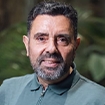With digital testing and monitoring of water quality, Ketos targets Brazilian agribusiness
The startup‘s solution serves from chemical industries to slaughterhouses and has a special appeal even for vertical farms and growers of vegetables in greenhouses
Janeiro 17, 2022
By Vitor Lima*
A tool that digitizes, automates and fully integrates the testing and monitoring processes of water quality parameters in real time. This is the solution from Ketos , a North American startup that seeks to reach the Brazilian market, serving rural producers, chemical industries and food processing companies.
All these companies have one characteristic in common: the use of water as a key resource for delivering their final product. In Brazil, the startup already serves agribusiness players in the meat and tobacco sector, in addition to sanitation companies.
In times of climate change and a clear need to preserve the planet's natural resources, the startup's solution helps to increase the quality of fresh products (such as vegetables and berries) and to monitor the disposal of waste, something of great value for agrochemicals and slaughterhouses.
Through sensor analysis, the startup prevents possible contaminants from the production activity from reaching rivers and groundwater, causing damage to the environment and society.
According to the United Nations World Water Resources Development Report 2021, freshwater consumption has increased 6-fold in the last century and is projected to grow by almost 25% from now until 2030 — as a result of population growth, economic development and changes in the level of employment and income of the population. In parallel, water quality has been falling exponentially and water stress has started to affect more than 2 billion people on the planet.

Demand for water has accelerated in recent decades, particularly in agriculture (Source: Aquastat)
“Our technology serves any company that uses water in its facilities. Size really doesn't matter. What is important, yes, is that the customer sees value in the data we generate and in having a fully automated operation to test and monitor the quality of the water that flows throughout its operation”, says Greg Slater, vice president of global sales at Ketos.
Abroad, Ketos' main customers in agro are producers of hydroponics (growing in aqueous solution with nutrients), berries and vertical farms. In these systems, water quality control provides an increase of 15% in the quality of products, ranging from lettuce and tomato to strawberries. In its latest investment round, a Series B, Ketos raised $30 million.
End of waiting for results

One of Ketos' main audiences in the US are vegetable growers in greenhouses and vertical farms (Photo: Canva/ ThisIsEngineering/ Pexels)
The solution replaces traditional methods, which require the purchase of a portable probe to assess the water resource, or even the manual work of collecting water samples to be sent to the laboratory and returned with the results in 15 to 20 days. “In the meantime, problems can come and go, and what's more, the decision maker is always reacting to past data,” says Slater.
Ketos' objective is to give the property or industry manager the chance to act actively on the data obtained in real time and analyze the results of their actions immediately as well. Field sensors capture data automatically and input it into the system.
Water quality monitoring
Ketos' software analyzes 31 different water quality parameters, which can be measured continuously or at the frequency required by the customer. Environmental factors are measured continuously (such as temperature or total dissolved solids), while analysis of heavy metals, nutrients and inorganic matter can be frequency adjusted, for every 30 minutes, one hour or longer.
The multiplicity of parameters serves crops supplied by groundwater, river, underground or surface water. When the system detects the presence of contaminants in the water source, it can issue an alert via email or SMS.

Ketos Shield centralizes the analysis of collected data and has a monthly subscription model
“We have a client in the US that is pulling water from groundwater and, because of the location of the well and the soil in the region, there is arsenic in the water, which has a direct impact on the quality and safety of your harvest,” says Steve Shaffer, vice president of marketing at the startup. Human exposure to arsenic, in this case, is a risk factor for cancer, skin and vascular diseases.
Scarcity in India has spawned a solution with global appeal
Today, Ketos has a worldwide presence. It is in the Americas, Europe, Oceania and the Middle East, supporting the use of water by companies that look to the quality of one of the most used natural resources in industry and agriculture.
Meena Sankaran, CEO and co-founder of Ketos, experienced the problem of lack of water, which sparked the desire to found the startup. Born in India, in Mumbai, she watched her family travel long distances to get some water, often still unfit for consumption. When got home, the water was boiled and the challenge of facilitating access to clean water became her more than private challenge.

Meena Sankaran, CEO and co-founder of Ketos
At the University of Texas at Arlington, USA, working on Data Centers, she developed her first system to automate water quality control. Through parameter analysis and the search for real-time data efficiency, she brought the necessary vision to found Ketos.
The startup's name is Greek and refers to the orca, the largest dolphin in the oceans. The reference symbolizes the founder and company's commitment to the preservation of life on the planet and in the seven seas.
*With editing by Marina Salles
Contatos









